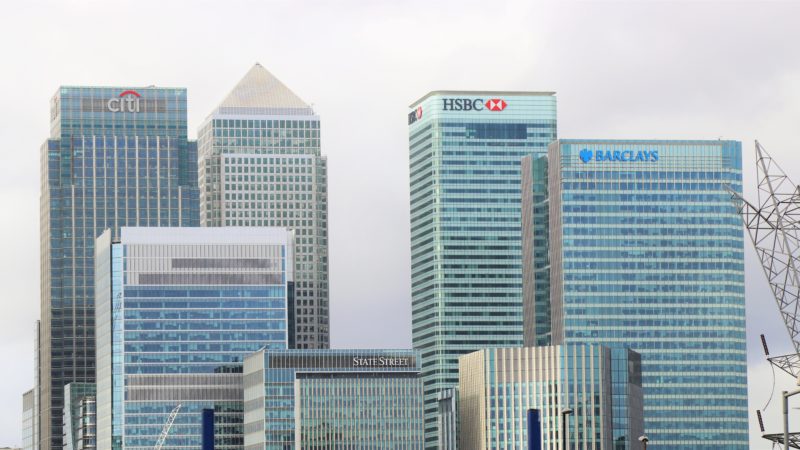Banks have a history of abusing small businesses.

The world’s’ major economies are gripped by coronavirus and its economic effects. Millions of workers have been laid-off and many businesses are relying upon the state for support and survival until the economy gets moving again. In this gloom, there is one sure winner – banks.
The UK government is offering more than £330bn of loans and guarantees, including interest-free loans of up to £5m for 12 months, to help businesses. The loans are administered through forty or so accredited lenders, effectively major banks.
Most of the accredited lenders have a history of unethical and corrupt practices. Their recklessness caused of the 2007-08 financial. They rigged interest and exchange rates and engaged in insider trading. They mis-sold financial products, such as mortgages, investment bonds, split-capital investment trusts, precipice bonds, interest rate swaps, self-invested personal pensions, payment protection insurance and pension transfer advice, to mention a few. They have been involved in tax avoidance and variety of illicit financial flows. There is little to suggest that fines have dulled their appetite for predatory practices.
The banks have a history of abusing borrowers, especially small and medium-sized businesses. In commenting upon the long-running saga of frauds at the Royal Bank of Scotland (RBS) and its turnaround division Global Restructuring Group (GRG), the House of Commons Treasury Committee concluded: “The overarching priority at all levels of GRG was not the health and strength of customers, but the generation of income for RBS, through made-up fees, high interest rates, and the acquisition of equity and property”. It added that: “The actions of GRG staff heaped untold misery on hard working business owners, recklessly destroying livelihoods in pursuit of profit.”
Despite obstruction from regulators, the Police and Crime Commissioner (PCC) for Thames Valley secured six criminal convictions for frauds at HBOS (part of Lloyds Banking Group).
The PCC stated that frauds of nearly £1bn “perpetrated by bankers within HBOS, with considerable collusion from other financial organisations and allied firms” resulted in a great number of companies being ruined, and the lives and livelihoods of their owners and those that worked with them being destroyed.
He added: “They were pursued for their personal guarantees, and lost their houses and possessions as the bank and its lawyers pursued them for all they owned. Families were split up, marriages ruined, and suicides resulted”.
Some banks have forged signatures on court documents to repossess property of the borrowers. Regulators continue to ape the three unwise monkeys.
Asking banks with a history of corrupt practices to nurture SMEs, without any safeguards, is akin to inviting Dracula to oversee the distribution of blood supply.
Some troubling signs are already there. The bank base rate is at an all-time low of 0.1% and legislators have said that lenders should be offering loans with interest rates closer to 1% to 4%. But that is not what banks are doing.
One entrepreneur said: “The government-backed loans are from £25,000 up to £5m”. “We got offered a financial product of theirs, another loan which is not part of the coronavirus package”. “It’s for up to £24,999, but will come at up to 22% interest, which would initially bankrupt my business”.
He was asked to borrow against his house and questioned why he was being asked to do so. Some banks have demanded personal guarantees from directors for securing government-supported emergency finance. Similar practices are also being encountered by other entrepreneurs.
Governments always have choices. The fact that they neglect some policy options is indicative of their self-imposed ideologies. After the 2007-08 crash, the government bailed out banks and could have retained some in public ownership and used them for directing regional and national investment and rebuilding the economy. Instead, they were mostly (re)privatised.
There is nothing to prevent the state from directly distributing its aid or forming one or more banks to channel the financial support through them. Such entities would remove the involvement of offending banks and ensure that the government financial support, as intended, is made available to businesses.
A publicly-owned bank would be subject to parliamentary scrutiny. Its executives would not be obsessed with maintaining share price or inflating profits through dubious practices to secure performance related bonuses. Their performance would be judged by how well they have implemented government policy. Yet this is not on the government’s radar.
The government’s £330bn support and the eventual entrapment of many businesses will enable banks to make super profits. These would effectively be resources diverted from hard-pressed businesses to banks, their executives and shareholders.
The government needs to levy windfall taxes on banks to ensure that they do not benefit from predatory practices. This needs to be accompanied by changes to their governance with seats for employees and customers or their boards. They should vote on executive pay to check selfish impulses.
Sadly, the government is more likely to appease the banking industry and do nothing. A stream of scandals is sure to follow.
Prem Sikka is Professor of Accounting at University of Sheffield and Emeritus Professor of Accounting at University of Essex. He is a Contributing Editor to LFF and tweets here.
To reach hundreds of thousands of new readers we need to grow our donor base substantially.
That's why in 2024, we are seeking to generate 150 additional regular donors to support Left Foot Forward's work.
We still need another 117 people to donate to hit the target. You can help. Donate today.



